Lord Voldemort Laughing in Different Languages
Nothing more really to say about this — funny laughing is funny.
See also Harry Potter and the Translator’s Nightmare and Harry Potter and the Artificial Intelligence.



This site is made possible by member support. 💞
Big thanks to Arcustech for hosting the site and offering amazing tech support.
When you buy through links on kottke.org, I may earn an affiliate commission. Thanks for supporting the site!
kottke.org. home of fine hypertext products since 1998.
Nothing more really to say about this — funny laughing is funny.
See also Harry Potter and the Translator’s Nightmare and Harry Potter and the Artificial Intelligence.
As part of the Wizarding World’s Harry Potter at Home initiative, they’re having an all-star cast read the first book in the series aloud on video. The first chapter was just released and it’s read by none other than Daniel Radcliffe himself. You can also listen on Spotify:
A new chapter with a different reader will be released each week — readers of future chapters include Stephen Fry, Dakota Fanning, and Eddie Redmayne.
Update: The next few chapters have been released: Noma Dumezweni’s chapter 2, Eddie Redmayne reads chapter 3, and Stephen Fry does chapter 4. The kids and I have been listening to this on Spotify in the car and we’re loving it. I liked Redmayne’s narration the best so far and Fry does an uncanny impression of Robbie Coltrane’s Hagrid voice.
In this faux HBO documentary short from Key & Peele, we visit Vincent Clortho Public School for Wizards, the American inner-city answer to Harry Potter’s Hogwarts.
“The hallways are a-bluster with the conversation of our Quidditch team.”
“Half the team is back here riding mops. We got two little [kids] on Swiffers.”
If the name “Vincent Clortho” sounds sorta familiar, that’s because they borrowed it from Ghostbusters (Vinz Clortho, the Keymaster).
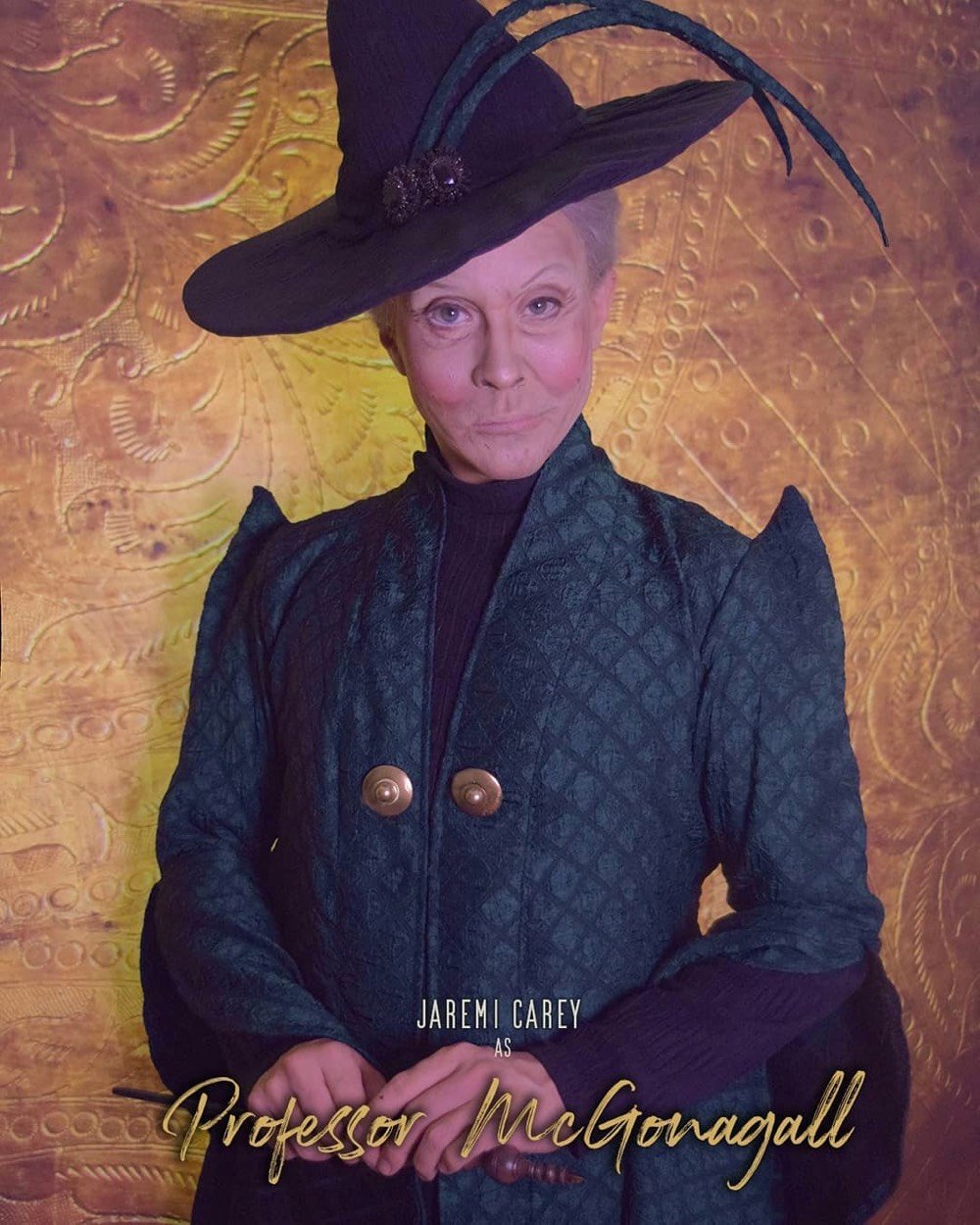
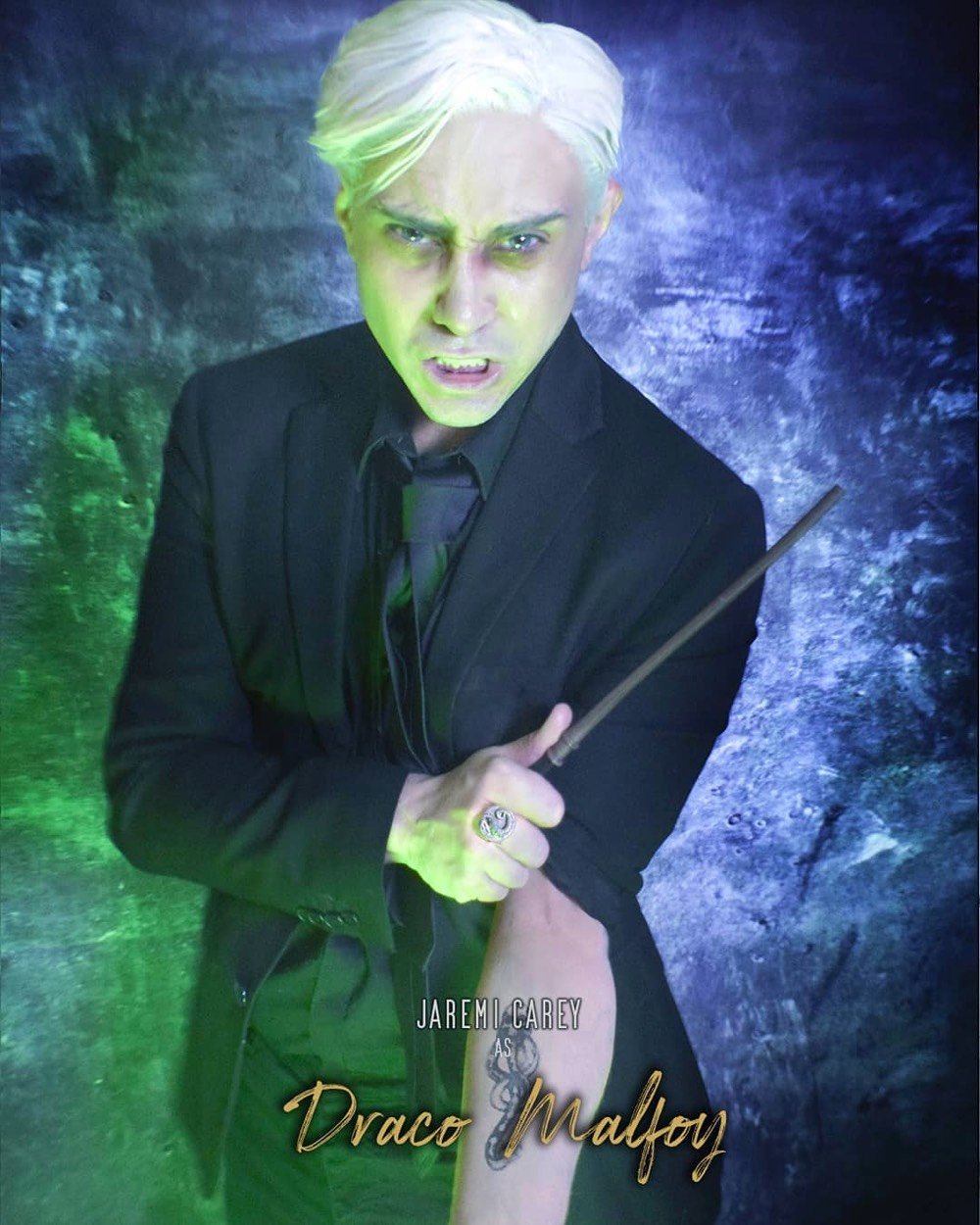
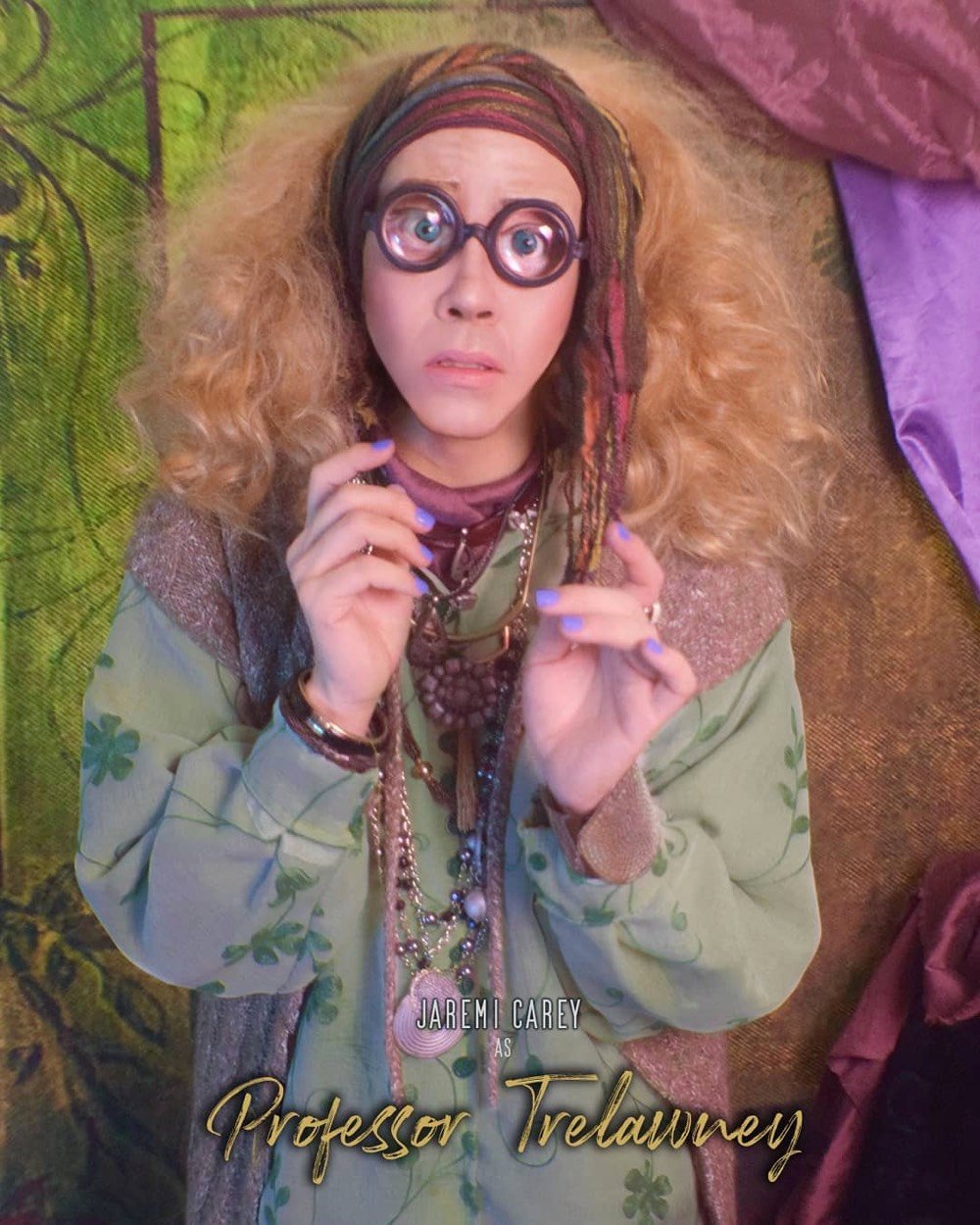
For his project 31 Days of Wizardry, Jaremi Carey has been dressing up as a different Harry Potter character each day in October and posting the results to his Instagram. These are great. Strong Cindy Sherman vibes when you view them all together. And his Dobby! He’s only done one of the main characters so far though (Hermione on polyjuice)…perhaps he’s saving Dumbledore, Harry, Ron, and Voldemort for the final days?
Carey previously did a similar 365 Days of Drag project in 2016. (via @rel_games)
In an episode of Pop Culture Detective, Jonathan McIntosh discusses The Fantastic Masculinity of Newt Scamander. Scamander is the hero of the Fantastic Beasts and Where to Find Them movie that takes place in the Wizarding World of Harry Potter.
Many reviews of the film found Scamander to be a weak hero, but McIntosh argues that the character offers a view of masculinity that we don’t often see in movies, “a gentle empathetic version of heroic masculinity”. Scamander is not The Chosen One (like Harry or Luke Skywalker)…he’s a male hero who is emotional and nurturing and whose strengths are vulnerability, sincerity, and sensitivity.
It’s funny, when I was reading Harry Potter with my kids, we talked a lot about the flaws in Harry’s heroism, e.g. how his hotheadedness frequently put him and his friends into danger. But I didn’t notice how much of strong and vulnerable hero Scamander was. I’m gonna have to go back and watch this again.
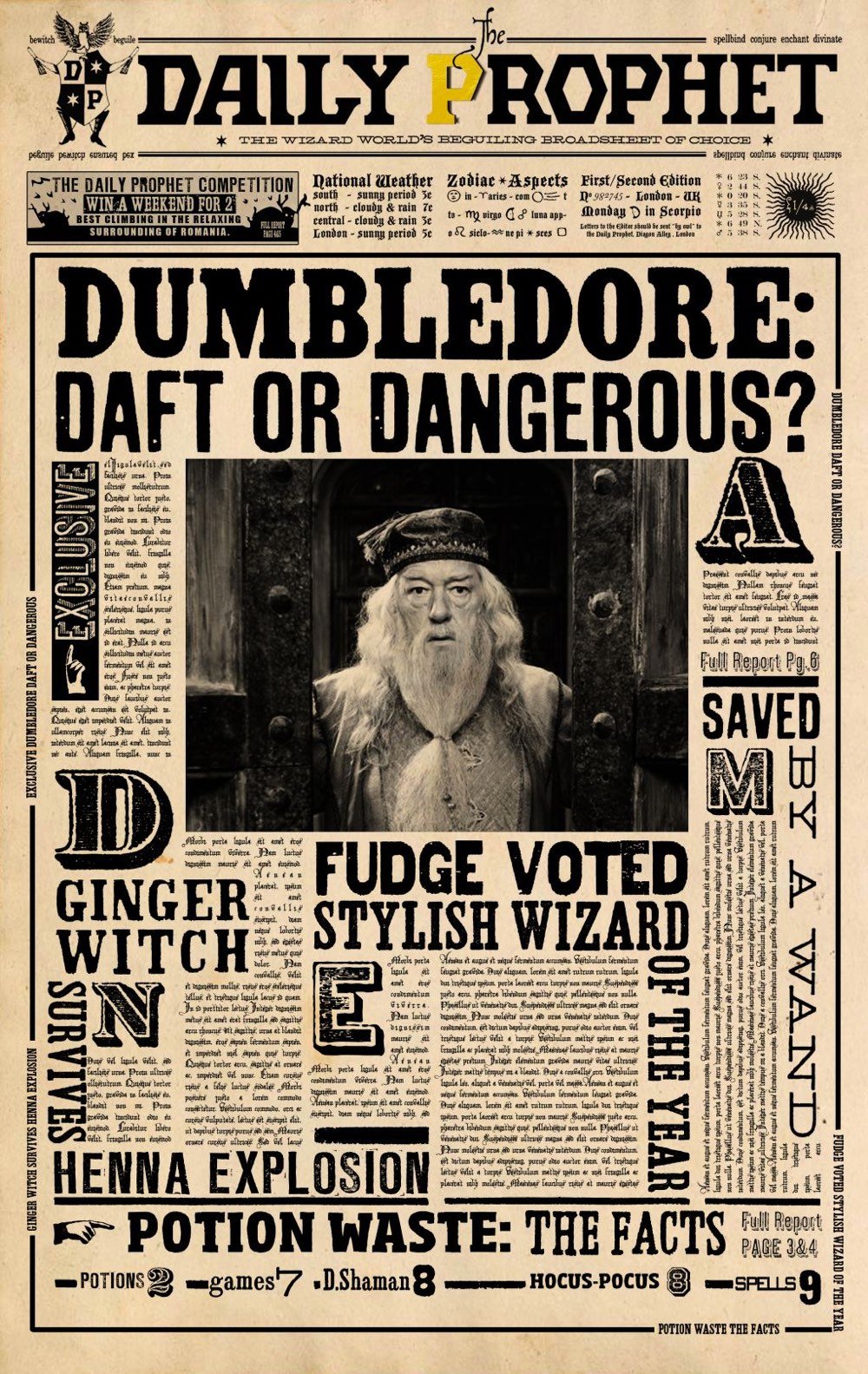
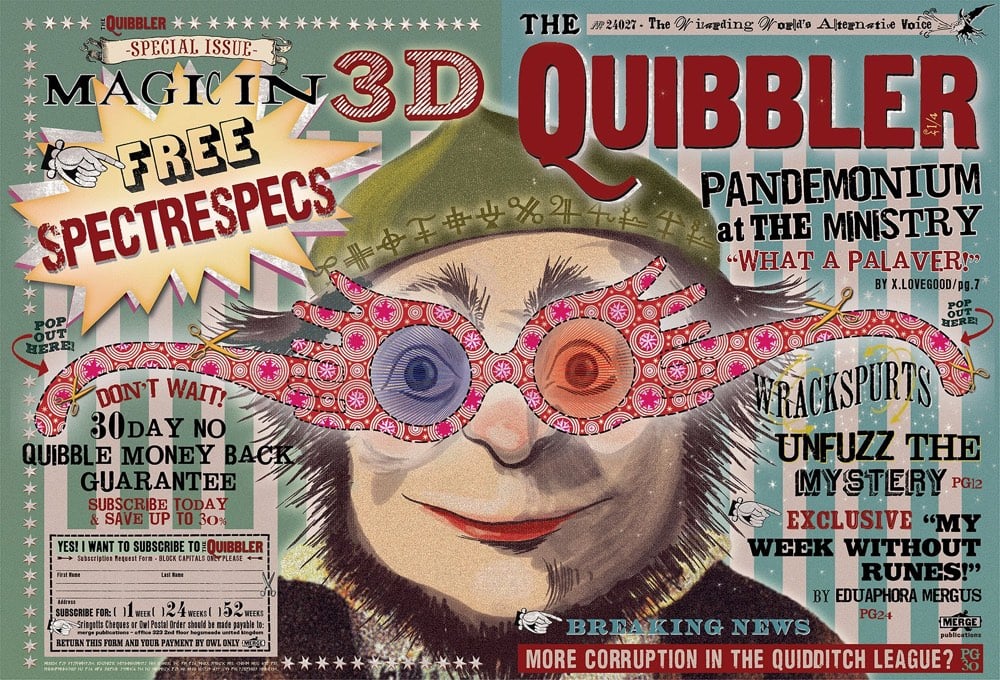
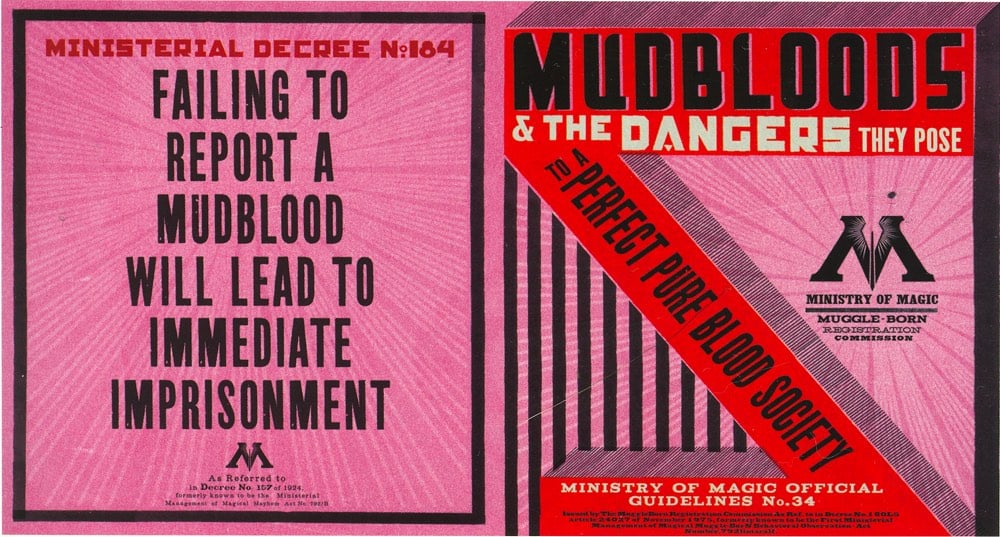
MinaLima (aka Miraphora Mina and Eduardo Lima) is the design studio that designs all of the graphics, signs, newspapers, decrees, posters, labels, maps, book covers, and packaging that you see in the Harry Potter movies.
The range of design styles on display is impressive and captures the films’ combination of humour, horror and fantasy.
On one wall, packaging and adverts for products in a shop owned by the Weasley family combine early 20th century print advertising with humorous taglines and garish colours, while posters promoting the fictional game of Quidditch (below) reference 1950s Olympics adverts.
Official notices and letters use hand written fonts, and pamphlets demonising ‘mudbloods’ — a wizard born to non-wizard parents — are inspired by Soviet progaganda (top).
“One of the best things about working on the Harry Potter films was being able to try out so many different styles, from Victorian letterpress to modern design,” says Lima.
“The Daily Prophet was designed to look very Gothic, as did the architecture of Hogwarts [the boarding school for wizards where the film is set]. When an organisation called the Ministry of Magic takes control in later films, the school becomes a kind of totalitarian state, so we started looking to Russian constructivist design to reflect that,” says Mina.
They also worked on the Fantastic Beasts movie. You can follow their work on Instagram and a bunch of the best stuff is available for purchase on their site.
Due to its popularity, the Harry Potter series of books has been translated into dozens of different languages from around the world. Given the books’ setting in Britain, heavy use of wordplay & allusions, and all of the invented words, translating the books accurately and faithfully was difficult.
Translators weren’t given a head-start — they had to wait until the English editions came out to begin the difficult and lengthy task of adapting the books. Working day and night, translators were racing against intense deadlines. Harry Potter and the Order of the Phoenix, the longest book in the series at 870 pages for the US edition, was originally published on June 21, 2003. Its first official translation appeared in Vietnamese on July 21, 2003. Not long after, the Serbian edition was released in early September 2003.
Also not mentioned in the video is all of the foreshadowing Rowling uses in the first few books in the series that pays off in later books. Since the translators probably didn’t know the plot details of the later books, some of that foreshadowing might have been edited out, downplayed, or misinterpreted.
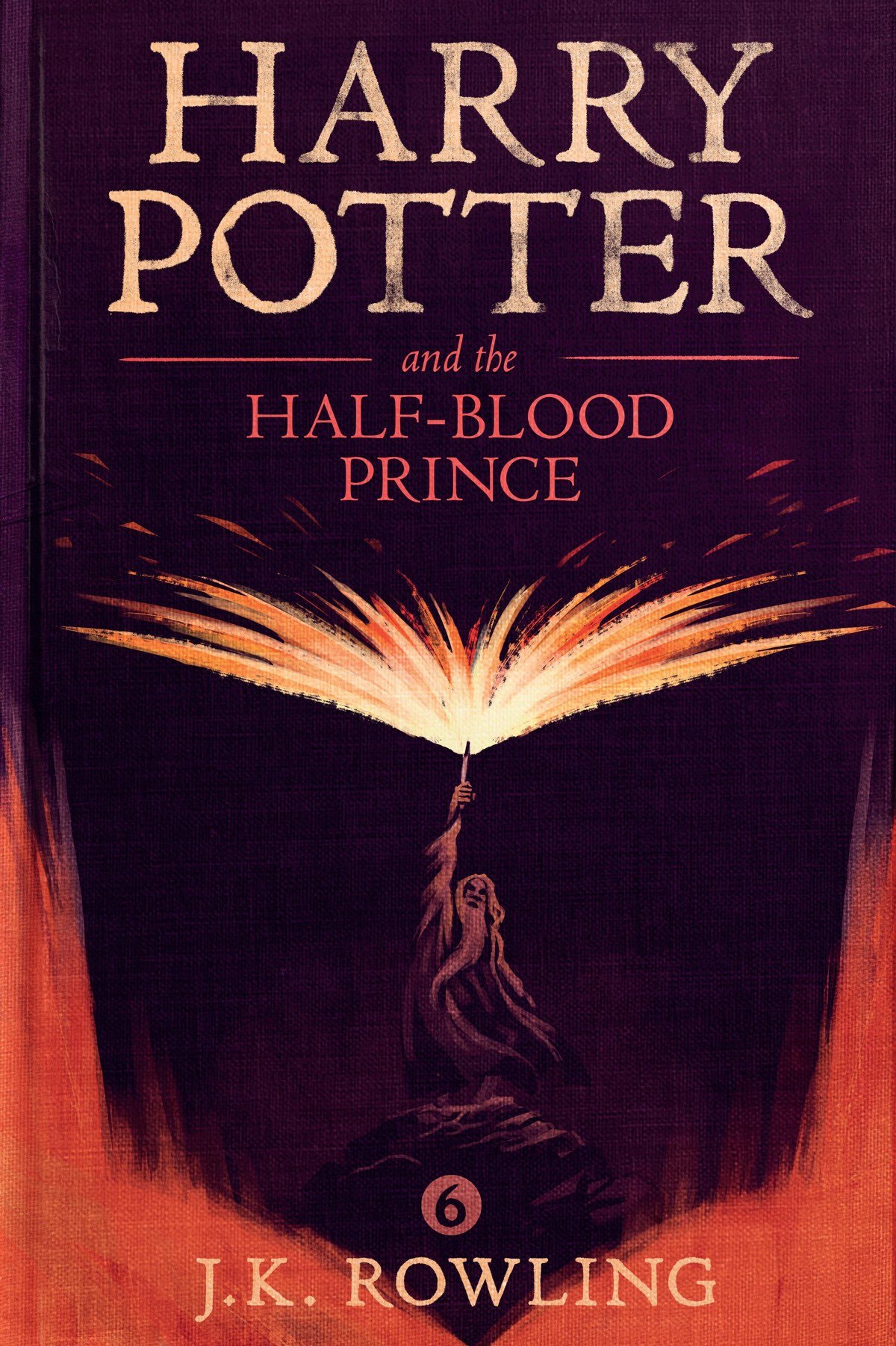
I first ran across the work of designer Olly Moss several years ago, when he designed some super-simple alternate posters for iconic movies. He’s since worked on a whole bunch of great stuff, like Firewatch and posters for Studio Ghibli. Just the other day, while the kids and I were finding out what our Patronuses are,1 I discovered that Moss not only designed the cover of the forthcoming ebook of Fantastic Beasts and Where to Find Them but also did the covers for all seven of the Harry Potter ebooks.
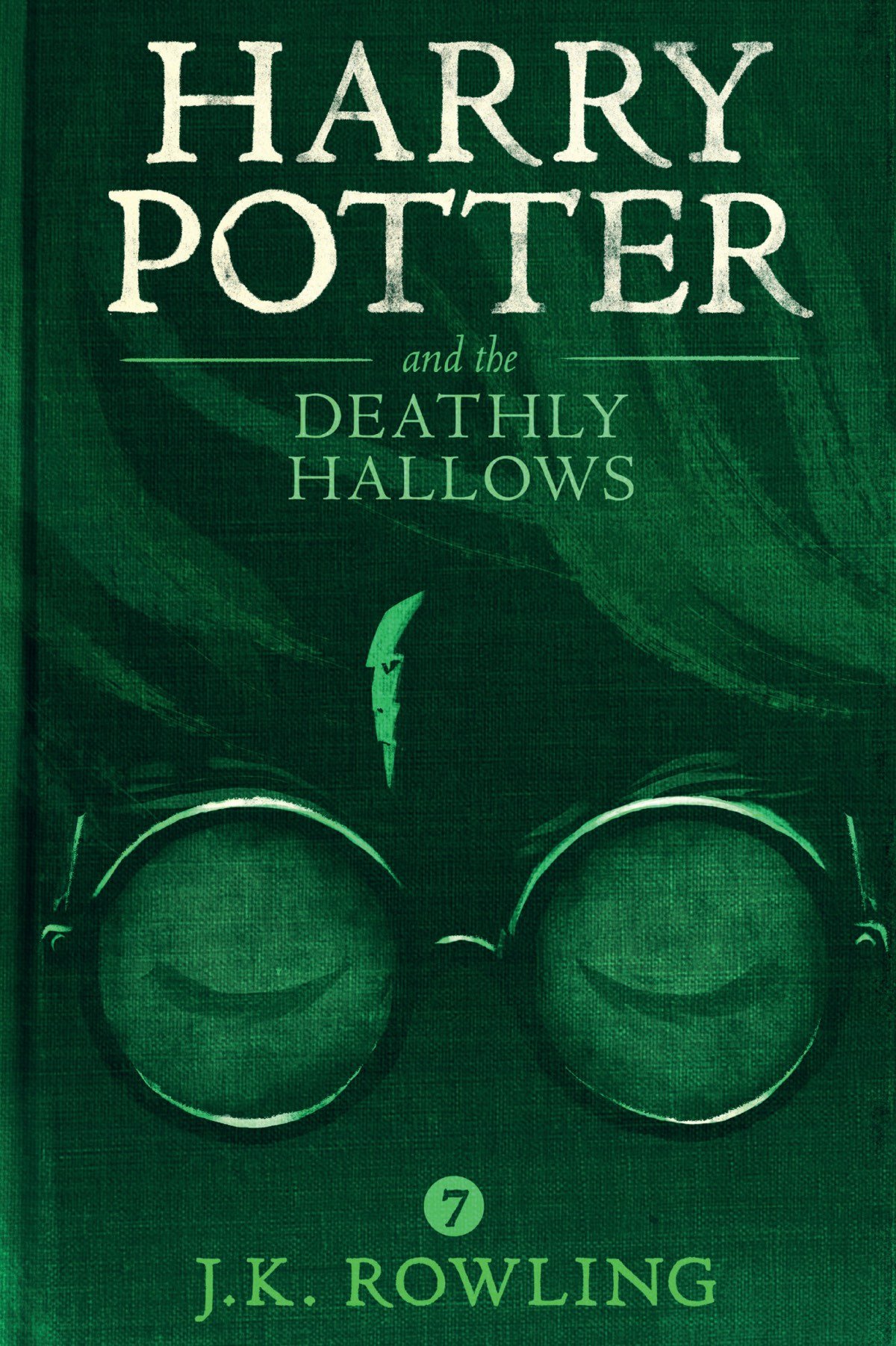
Moss’ main technique, of combining two or more aspects of the story into a single image, is on full display in the Potter covers — the prison on a rock shaped like a dog for Azkaban, Voldemort as Harry’s scar for Hallows, and Dumbledore’s spell casting forming the pages of a textbook for Half-Blood Prince.
My Patronus is a badger. We also got sorted into our Hogwarts houses (Gryffindor for all three) and picked out wands (mine makes me sound like kind of an asshole). The sorting and wand choosing processes are basically personality tests. If you’ve never sat down with your kids and taken a personality test, I encourage you to do so. It was quite enlightening, not only seeing what they chose, but also seeing how they reacted to my choices and, especially, how I felt making those choices in front of them. I answered pretty honestly about who I think I am and what I would do in certain situations, but being watched so closely by two small humans who look to me to guide their choices in life was unsettling and caused me to second-guess some things. Like I said, enlightening.↩
From Accio to Wingardium Leviosa, this is a supercut of every spell uttered in the 8 Harry Potter movies. Lots of Expecto Patronum, Expelliarmis, and Stupefy. As supplementary reading, here’s a list of spells in Harry Potter from Wikipedia.
Max Deutsch trained a neural network using the first four Harry Potter books and then asked it to write its own chapter.
“The Malfoys!” said Hermione.
Harry was watching him. He looked like Madame Maxime. When she strode up the wrong staircase to visit himself.
“I’m afraid I’ve definitely been suspended from power, no chance - indeed?” said Snape. He put his head back behind them and read groups as they crossed a corner and fluttered down onto their ink lamp, and picked up his spoon. The doorbell rang. It was a lot cleaner down in London.
Hermione yelled. The party must be thrown by Krum, of course.
Harry collected fingers once more, with Malfoy. “Why, didn’t she never tell me. …” She vanished. And then, Ron, Harry noticed, was nearly right.
“Now, be off,” said Sirius, “I can’t trace a new voice.”
Rowling, your job is safe for now. Deutsch did the same thing with the Hamilton soundtrack…the result is not particularly good but that last line!
Update: Another similar effort is available here.
Ron’s Ron shirt was almost as bad as Ron himself.
“If you two can clump happily, I’m going to get aggressive,” confessed the reasonable Hermione.
“What about Ron magic?” offered Ron. To Harry, Ron was a loud, slow, and soft bird. Harry did not like to think about birds.
Using a 5000-word dictionary of words rated on their happiness, the Hedonometer measures the average happiness on Twitter.
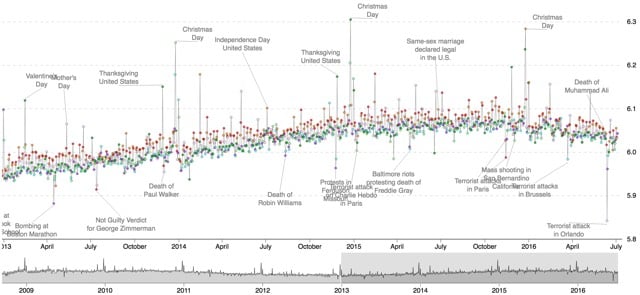
Christmas is always the happiest day of the year (“merry”, “happy”, and “joy” are all pretty positive) while shootings and terrorist attacks are Twitter’s saddest events. The recent mass shooting in Orlando seems to be the least happy Twitter has been over the past 7+ years.
The Hedonometer also analyzes the overall happiness of movies based on their scripts. The happiest movie is Sex in the City while the saddest is Omega Man (followed by The Bourne Ultimatum). Somehow, the fourth happiest movie is Lost in Translation, which might be reason for some overall skepticism about the project’s sensitivity to context.
The happiness over time of individual movie scripts has been analyzed by the Hedonometer too. Pulp Fiction’s happiest moment is when Vincent and Mia go to Jackrabbit Slim’s and the low point is “Bring out the Gimp”.
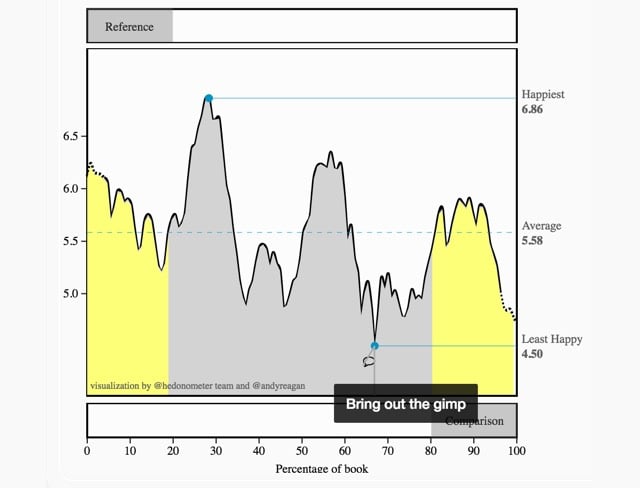
The system has analyzed books as well…the low point of the entire Harry Potter series seems to be the event at the end of The Half-Blood Prince.
Update: Grain of salt and all that, but the shootings of Alton Sterling, Philando Castile, and the Dallas police officers have pushed the happiness quotient on Twitter lower again so that the two least happy days have both occurred in the past month. There’s been a general feeling that 2016 has been a bad year, like George RR Martin is writing it. I wish the data were available for a closer analysis, but if you look at the chart, you can see that Twitter’s overall happiness starts to rise around the end of 2012 but starts to fall again right around the beginning of 2016…the effect is quite clear, even just from eyeballing it.
On Twitter this morning, Little Brown UK announced that they will be publishing an 8th Harry Potter book called Harry Potter and Cursed Child. The book is the rehearsal script of the play of the same name co-written by Rowling. Which is a bit disappointing, to be honest…play scripts are not fully-formed books. Anyway, from the play’s website, here’s the vague plot:
It was always difficult being Harry Potter and it isn’t much easier now that he is an overworked employee of the Ministry of Magic, a husband and father of three school-age children.
While Harry grapples with a past that refuses to stay where it belongs, his youngest son Albus must struggle with the weight of a family legacy he never wanted. As past and present fuse ominously, both father and son learn the uncomfortable truth: sometimes, darkness comes from unexpected places.
Even though employees are probably still in their jammies at home, you can already pre-order the book on Amazon. (via mic)
Harry Potter and the Half-Blood Prince reimagined as a wacky teen comedy. Excellent editing and music choice elevate this above similar efforts.
Evan Puschak, aka the Nerdwriter, explains why the third movie in the Harry Potter series, The Prisoner of Azkaban, is the best film in the series — spoiler: because Alfonso Cuarón — and why that matters for the young fans of the series: for some, it’s their first exposure to good filmmaking.
In this short video (oh just be patient and watch the whole damn thing), Alan Rickman demonstrates how I feel this morning that he has died of cancer at the age of 69. (Same age and affliction as Bowie, you’ll note.)
That Rickman never won an Oscar (he did receive a Golden Globe, an Emmy, a Bafta and many more) became a perennial topic in interviews but did not seem to trouble the actor himself. “Parts win prizes, not actors,” he said in 2008. It was the wider worth of his art to which Rickman remained committed, saying that he found it easier to treat the work seriously if he could look upon himself with levity.
“Actors are agents of change,” he said. “A film, a piece of theatre, a piece of music, or a book can make a difference. It can change the world.”
I loved Rickman as Hans Gruber in Die Hard and as Dr. Lazarus in Galaxy Quest, but I’ll remember his turn as Severus Snape in the Harry Potter films the most. Among several fantastic actors in that series, Rickman’s performance was arguably the best. Many characters in Potter struggled between the good and not-so-good sides of themselves (including Harry and Dumbledore) but none of them carried that battle off as well as Rickman’s Snape.
The most teasing of teaser trailers is out for Fantastic Beasts and Where to Find Them, the Harry Potter prequel that everyone insists isn’t a prequel. Out November 2016. (via trailer town)
Update: Toooootally a prequel…Dumbledore gets name-dropped in this one:
Update: The full trailer has been released:
Everyone knows that The Karate Kid is the story of Daniel LaRusso, an undersized new-kid-in-school who, with the help of a wise mentor and unconventional training in the martial arts, is able to triumph over a gang of bullies picking on him. What this video presupposes is, maybe Daniel is the real bully?
To no one’s surprise, Johnny advances to the final round and karma catches up with Daniel when his leg is injured by the boy he wantonly attacked on the soccer field. However, just as Johnny is about to be awarded his trophy, Daniel is granted unnatural strength by the demon sorcerer Miyagi, enabling him to defeat Johnny and win the tournament in an upset.
See also more revisionist history of beloved media: Hermione Granger as the real hero of the Harry Potter books and Tim Carmody’s The Iceman List, which is about “classic movie antagonists who were actually pretty much right all along”.
Update: Another one to add to the list: Ross Geller is the hero of Friends, an intellectual and romantic man who is brought low by his so-called friends:
But the characters of the show were pitted against him from the beginning (consider episode 1, when Joey says of Ross: “This guy says hello, I wanna kill myself.”) In fact, any time Ross would say anything about his interests, his studies, his ideas, whenever he was mid-sentence, one of his “friends” was sure to groan and say how boring Ross was, how stupid it is to be smart, and that nobody cares. Cue the laughter of the live studio audience. This gag went on, pretty much every episode, for 10 seasons. Can you blame Ross for going crazy?
And like a Greek tragedy, our hero is caught in a prophecy that cannot be avoided. The show’s producers, akin to the immutable voice of the gods, declared that Ross must end up with Rachel, the one who shops. Honestly, I think he could’ve done better.
This is an interesting theory about the Harry Potter series: the whole thing is about a mentally ill young boy (Harry) who is institutionalized by his parents (the Dursleys) in a mental institution (Hogwarts) and the contents of the books are Harry’s fantasy.
In the Harry Potter series, his parents are famous wizards, who were famous in all the world for their unparalleled love for the boy Harry, which set the whole series in motion, killing them and leaving the boy a scarred orphan. (This is a fantasy, crafted as the direct opposite of the way in which children usually end up scarred — through abuse and neglect.)
If we interpret the story as Harry’s fantasy, then the Dursleys are Harry’s real parents, and the Potters are imaginary. The Durselys either can’t cope with the increasingly-delusional boy living with them, or perhaps they are merely abusive, and it’s the abuse that’s making him delusional. In any event, the parent-figures constantly mistreat him, favor the brother, and inflict endless cruelty and humiliation on him. One day, Harry snaps, and Dudley (who is really Harry’s brother) is severely injured, in a way requiring repeated hospital treatments. (In the delusion, Harry imagines that a pig’s tail is magically grown from Dudley’s buttocks.) As a result of this incident, Harry is taken away to a “special school.”
In order to keep the Harry Potter gravy train going, Scholastic and Bloomsbury are releasing a fully illustrated version of each of the seven Harry Potter books over the next seven years. Here’s the cover for Harry Potter and the Sorcerer’s Stone:
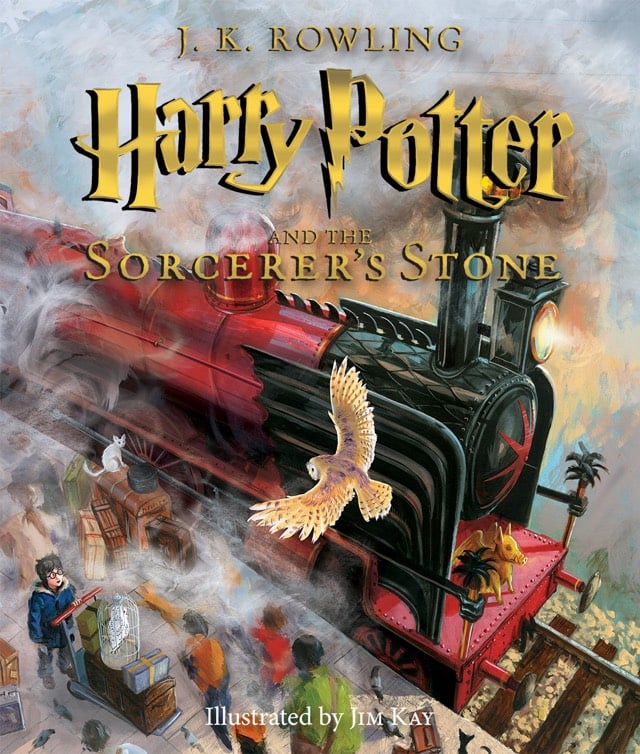
The book will contain 100+ full-color illustrations done by Jim Kay. (via buzzfeed)
Along with imagining Mary Poppins as one of Doctor Who’s Time Lords, one of my favorite literary alternate realities is imagining Hermione Granger as the main character of the Harry Potter books. In 2011, Sady Doyle wrote a review of the books as if Rowling had focused on Hermione.
In Hermione, Joanne Rowling undermines all of the cliches that we have come to expect in our mythic heroes. It’s easy to imagine Hermione’s origin story as some warmed-over Star Wars claptrap, with tragically missing parents and unsatisfying parental substitutes and a realization that she belongs to a hidden order, with wondrous (and unsettlingly genetic) gifts. But, no: Hermione’s normal parents are her normal parents. She just so happens to be gifted. Being special, Rowling tells us, isn’t about where you come from; it’s about what you can do, if you put your mind to it. And what Hermione can do, when she puts her mind to it, is magic.
Ditto for the whole “Chosen One” thing. Look: I’ve enjoyed stories that relied on a “Chosen One” mythology to convince us that the hero is worth our time. I liked Buffy the Vampire Slayer as much as anyone. But it’s hard to deny that “Chosen Ones” are lazy writing. Why is this person the hero? Because everyone says he’s the hero. Why does everyone say he’s the hero? Because everyone says so, shut up, there’s magic.
And more recently, Daniel Dalton had a more overtly feminist and humorous take.
It was clear that she was the one who was protecting Harry and Ron, and this was never more evident than when she revealed she could control time.
She’d been using her Time-Turner to attend twice the number of classes, but she agreed to use it to help Harry save his godfather, even though it meant she’d never be able to use it again.
She’d given up her greatest power for her best friend, because helping people made her feel good.
And though she hoped he understood the sacrifice she was making by letting her education slide, she knew he didn’t. Because men.
Over the past year or so, I’ve been rereading the books and rewatching the movies with my kids through the Hermione-as-hero lens. And I’ve noticed that even without altering the story as Doyle and Dalton do, Hermione is by far the smartest, most loyal, and bravest young witch or wizard at Hogwarts. Harry has his moments but the kid had a rough and abusive childhood and so his principal talent is getting angry and doing stupid impulsive shit. Mainly, he’s manipulated by Voldemort and Dumbledore into doing exactly what they want him to do, and he plays the part splendidly. On the other hand, Hermione is an amazing witch and has a real choice as to how she wants to apply her considerable talents. And she chooses goodness, friendship, and doing the right thing over comfort, power, and even her own family, every time. (via @djacobs)
Some recent studies suggest that reading Harry Potter may make kids nicer people.
As the familiar story goes, not long ago there was an orphan who on his 11th birthday discovered he had a gift that set him apart from his preteen peers. Over the years he endured the usual adolescent challenges — maturation, relationships, social conflicts, general teenage neuroses. He also faced the less common challenge of battling a murderous, psychopathic wizard set on establishing a eugenic police state. I’m referring to the young wizard Harry Potter, the bespeckled, morally-upright protagonist in author JK Rowling’s wildly popular fantasy book series; his nemesis is Lord Voldemort, the story’s malevolent antagonist. And, while it might sound far-fetched, new research suggests that Rowling’s world of house-elves, half-giants and three-headed dogs has the potential to make us nicer people.
I’ve been reading Harry Potter with the kids for awhile now. We’re almost finished with The Prisoner of Azkaban. One of my favorite parts of reading it with them is when they’re confused about a situation or a particular word and we get to have a conversation. While reading Chamber of Secrets, we talked about mudbloods, prejudice, and fascism. We’ve talked about good and evil and how many of the books’ characters actually possess both good and not-so-good qualities. More recently, we talked about bravery and cowardice in the context of being a friend and how even Neville, who seems frightened of everything, is a brave and true friend for trying to stop Hermione, Ron, and Harry from leaving the Gryffindor common room in search of the Sorcerer’s Stone. I don’t know if they’re better people for it, but I value the chance to have those conversations with them about something they’re really into.
In a piece for the Pottermore web site, JK Rowling writes an update on how the gang from the Harry Potter books is doing. The piece is an account of the Quidditch World Cup Final written by Rita Skeeter, the gossip columnist from the books. You need a login to read it on Pottermore, but someone uploaded it to Reddit as well.
The Potter family and the rest of Dumbledore’s Army have been given accommodation in the VIP section of the campsite, which is protected by heavy charms and patrolled by Security Warlocks. Their presence has ensured large crowds along the cordoned area, all hoping for a glimpse of their heroes. At 3pm today they got their wish when, to the accompaniment of loud screams, Potter took his young sons James and Albus to visit the players’ compound, where he introduced them to Bulgarian Seeker Viktor Krum.
About to turn 34, there are a couple of threads of silver in the famous Auror’s black hair, but he continues to wear the distinctive round glasses that some might say are better suited to a style-deficient twelve-year-old. The famous lightning scar has company: Potter is sporting a nasty cut over his right cheekbone. Requests for information as to its provenance merely produced the usual response from the Ministry of Magic: ‘We do not comment on the top secret work of the Auror department, as we have told you no less than 514 times, Ms. Skeeter.’ So what are they hiding? Is the Chosen One embroiled in fresh mysteries that will one day explode upon us all, plunging us into a new age of terror and mayhem?
That last line is one of a few references to possible new stories in the piece…the last paragraph mentions a new biography of Harry and his pals due out at the end of this month:
And for those who want to know exactly how imperfect they are, my new biography: Dumbledore’s Army: The Dark Side of the Demob will be available from Flourish and Blotts on July 31st.
Could Rowling be setting the stage for an eighth Potter book or is she just winding us up?
What if Ayn Rand had written Harry Potter? It might go a little something like this.
Professor Snape stood at the front of the room, sort of Jewishly. “There will be no foolish wand-waving or silly incantations in this class. As such, I don’t expect many of you to appreciate the subtle science and exact art that is potion-making. However, for those select few who possess, the predisposition…I can teach you how to bewitch the mind and ensnare the senses. I can tell you how to bottle fame, brew glory, and even put a stopper in death.”
Harry’s hand shot up.
“What is it, Potter?” Snape asked, irritated.
“What’s the value of these potions on the open market?”
“What?”
“Why are you teaching children how to make these valuable products for ourselves at a schoolteacher’s salary instead of creating products to meet modern demand?”
“You impertinent boy-“
“Conversely, what’s to stop me from selling these potions myself after you teach us how to master them?”
“I-“
“This is really more of a question for the Economics of Potion-Making, I guess. What time are econ lessons here?”
“We have no economics lessons in this school, you ridiculous boy.”
Harry Potter stood up bravely. “We do now. Come with me if you want to learn about market forces!”
The students poured into the hallway after him. They had a leader at last.
I have to admit, this alternate Harry Potter ending would have been pretty great.
Harry Potter would, forever, be The Boy Who Lived.
Earlier this year, Hogwarts School of Witchcraft and Wizardry was subjected to a review by the Board of Education and was found wanting in several areas.
Pupils at Hogwarts have access to a reasonably wide range of esoteric qualifications, suited to its key demographic. As an independent school, it does not have to follow the National Curriculum closely; however, it is disappointing to note that basic requirements such as English, Mathematics and Religious Education are all lacking or entirely missing from the school’s syllabus. This has had adverse effects on all students, many of whom have never even been taught basic KS1 or 2 literacy. A few students have attended state or independent primary schools, and these students typically perform very well in contrast to their peers.
The majority of students appear to be under-performing, with most pupils struggling in all their lessons, most of which appear to be set at too challenging a level. One particular class, which seemed to be based on A-Level chemistry, proved too difficult for even the most proficient students. Only one pupil managed to complete the lesson objectives, mainly thanks to his use of an annotated text book.
(via slate)
Well, sort of. Rowling is writing a screenplay for Warner Bros. based on a Hogwart’s textbook called Fantastic Beasts and Where to Find Them.
Although it will be set in the worldwide community of witches and wizards where I was so happy for seventeen years, ‘Fantastic Beasts and Where to Find Them’ is neither a prequel nor a sequel to the Harry Potter series, but an extension of the wizarding world. The laws and customs of the hidden magical society will be familiar to anyone who has read the Harry Potter books or seen the films, but Newt’s story will start in New York, seventy years before Harry’s gets underway.
On the eve of the release of her first novel specifically written for adult readers, Ian Parker profiles J.K. Rowling for the New Yorker. In many ways, this passage about Harry Potter sums up Parker’s take on Rowling herself:
For all the satisfying closure provided by “Harry Potter and the Deathly Hallows,” gloomier readers may still detect a note of melancholy; there is a narrowness of life for former Hogwarts students, whose career opportunities barely extend beyond the wizard civil service, wizard schoolteaching, and professional Quidditch. This magical society has no use for science; there’s little commerce; and thousands of years of wizarding seems to have generated no culture beyond a short volume of fables and a tabloid newspaper. (Wizard technology is often a cutely flawed approximation of non-wizard technology — owls for e-mail — and one wonders how quickly Harry and his schoolfriends could have won their battles against the evil Lord Voldemort, given two or three cell phones and a gun.) In a time of wizard peace, at least, Harry’s separation from the real world — even as he lives in it — can seem tragic.
In a time of personal prosperity, Rowling’s separation from the real world — even as she lives in it — can seem tragic.
From Sady Doyle, an alternate history of the Harry Potter series if Rowling would have written the books from the perspective of Hermione Granger.
So, before she goes away for good, let us sing the praises of Hermione. A generation could not have asked for a better role model. Looking back over the series — from Hermione Granger and the Philosopher’s Stone through to Hermione Granger and the Deathly Hallows — the startling thing about it is how original it is. It’s what inspires your respect for Rowling: She could only have written the Hermione Granger by refusing to take the easy way out.
For starters, she gave us a female lead. As difficult as it is to imagine, Rowling was pressured to revise her initial drafts to make the lead wizard male. “More universal,” they said. “Nobody’s going to follow a female character for 4,000 pages,” they said. “Girls don’t buy books,” they said, “and boys won’t buy books about them.” But Rowling proved them wrong. She was even asked to hide her own gender, and to publish her books under a pen name, so that children wouldn’t run screaming at the thought of reading something by a lady. But Joanne Rowling never bowed to the forces of crass commercialism. She will forever be “Joanne Rowling,” and the Hermione Granger series will always be Hermione’s show.
Worknik has a fun post up about the language of the Harry Potter books & movies.
Characters’ names are often also common words. A dumbledore is a bumblebee. Snape is a ship-building term that means “to bevel the end of (a timber or plank) so that it will fit accurately upon an inclined surface.” Hagrid is the past participle of hagride, which means “to harass or torment by dread or nightmares.” Skeeter is a term for an annoying pest, and not just Rita Skeeter, blood-sucking journalist. Mundungus is “waste animal product” or “poor-quality tobacco with a foul, rancid, or putrid smell,” a good name for a sneaky thief.
(via @djacobs)
If you’re headed out to see the final Potter movie this weekend, here’s a recap of the previous seven films in just seven minutes:
Stay Connected